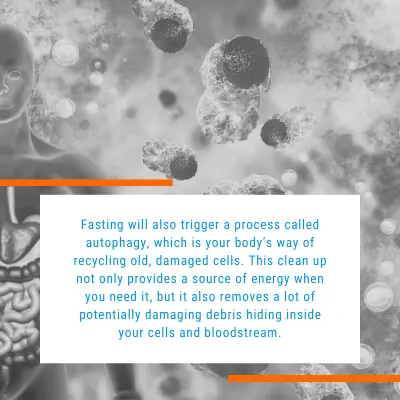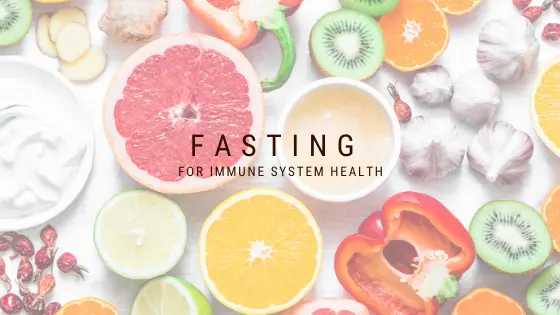Fasting has been the subject of many studies surrounding longevity and high quality of life many years, and a big part of why it is so effective is because of the many benefits of fasting to our immune system.
Our immune system is what protects us from everything from the cold virus going around the office to an infection from an accidental cut and even cancer. It’s incredibly complex and very interesting if you’re into that sort of thing like I am. It involves a wide variety of organs, systems and cells and works in many seemingly mysterious ways to protect you from germs, viruses, bacteria and all forms of disease. How does it do all that and what happens if it stops working? I’ll cover all that and more in this article.
Immune System Function – How it Works
Your skin, hair and even mucus all play a role in your immune system, but there’s also a more specialized defense system that can be called on to handle specific intruders.
Many symptoms that we’ve come to associate with illness are actually signs that our immune system is working to get rid of danger: fever, inflammation and pus, for example.
Inflammation, including symptoms like swelling, heat and, of course, pain, is your body’s way of protecting an injured area and speeding up the healing process. Pus is something we don’t usually like to think about too closely, but it’s a sign that your white blood cells have conquered a pathogen, any microorganism that might cause disease.
Your white blood cells are an incredibly important player in your immune system health. Some white blood cells self-destruct after eating a single pathogen and others live long, disease-fighting lives. You even have some cells that can tell if your once-healthy cells have been infected with a virus or cancer and will kill that cell before it can become dangerous.
If, for any reason, your initial immune response isn’t strong enough to heal you, your adaptive defense system will be called to action in response to a very specific pathogen. Every time you come into contact with a potential danger, whether that’s through a vaccination or the air in a roomful of children with the flu, your immune system takes notes.
Again, calling on specialized white blood cells, antibodies are released to target the specific invader that has been identified. This is a very effective system and explains why most people only catch the chickenpox once, for example. If ever it’s reintroduced, your blood has the specific information needed to shut it down before it causes any problems.
Reset Your Immune System – Myth or Fact?
In a healthy body, your immune system should effectively keep you relatively safe. More and more often, however, we’re finding that our immune systems are simply not enough to stand up to 21st century living and, sometimes, the immune system even goes rogue and starts to attack itself, as in autoimmune disorders. Defects in your immune system are also responsible for much of the aging process.
When that happens, is it possible to reset your system so that you can start healing again?
Studies suggest that the answer is yes, and that fasting is the key to this renewal. Dr. Valter Longo has dedicated much of his career to studying the effects of fasting on the aging process and has also studied the effects of fasting in the treatment of cancer. He found that fasting reduces white blood cell count.
After learning about how important our white blood cells are, this sounds terrible. But what happens is that your body is given the signal to start producing new, healthy and energetic white blood cells to replace the older, less efficient ones that die off during fasting. This is what is meant by immune system regeneration.
Fasting will also trigger a process called autophagy, which is your body’s way of recycling old, damaged cells. This clean up not only provides a source of energy when you need it, but it also removes a lot of potentially damaging debris hiding inside your cells and bloodstream.
Fasting has also been shown to lower growth hormone, which is linked to cancer and tumor growth as well as aging. Other studies have indicated that fasting can help protect your brain from neurodegenerative diseases.

How to Fast to Reset Your Immune System
Fasting has been practiced at least since the beginning of recorded history and remains a key facet of many religions to this day. The more we learn about it, the more popular it becomes as a specific proactive health measure.
Dr. Longo developed a “fasting-mimicking diet,” designed to allow a minimal amount of calorie intake with a very specific macronutrient breakdown over a 5-day period that will create the same biological benefits of a complete prolonged water fast without the dangers associated with complete nutrient depletion.
Time-restricted feeding (TRF), also commonly referred to as intermittent fasting (IF), is also thought to have similar benefits and be much easier to accomplish, especially for those new to fasting. Simply restricting the hours per day in which you eat to 12 hours or less, without changing the number of calories you eat, can have dramatic results for your immune system function.
For best results, it’s also important to consistently try to improve the quality of the calories you’re eating on a regular basis and avoid overeating whenever possible.
Immune System Benefits of Fasting
Your immune system is the best defense you have against disease and aging, not to mention repair from day to day injury. Just like everything else in life, it can get worn down and needs a little TLC to revive itself. Fasting has shown tremendous potential in resetting immune system function:
- Fasting will trigger the death of old, ineffective white blood cells and the reproduction of fresh new white blood cells to replace them
- Not only can fasting help your day to day health, but it can also help renew your immune system after significant damage has occurred, such as in the case of undergoing chemotherapy
- Fasts as short as 12 hours or even calorie-restricted, 5-day fasting-mimicking diets can achieve incredible immune system repair results
Fasting is not a miracle cure and it shouldn’t be abused. Depriving yourself of nutrition in the long-term can have the opposite results, actually impairing your immunity, so it’s important that you’re safe and supervised when doing any form of long-term fasting. That being said, fasting can also be one of the greatest proactive health techniques to practice. If you’re interested in learning more about how fasting can improve many aspects of your life, read our related post, Is Fasting Healthy, next.




